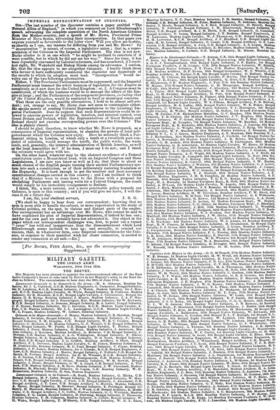IMPERIAL REPRESENTATION OP COLONIES.
Sra—The last number of the Spectator contains a paper entitled "The Natural Allies of England," in which you comment on Lord Ellenborough's
each advocating the complete separation of the North American Colonies from the Mother-country, and a speech of Mr. Howe, Provincial Prime Minister of Nova Scotia, advocating their incorporation. In that paper you express yourself as favourable to the latter view. Will you allow me to state, ea shortly as I can, my reaaons for differing from you and Mr. Howe ? By " incorporation " is meant, of course, a legislative union ; that is, a repre- sentation of the Colonies in the Imperial Parliament. His idea is not new. Burke alludes to it as one which "he might be inclined to entertain if it were possible, but to which he did not see his way." Since his time, it has been repeatedly canvassed by Colonial reformers, and has numbered, if I recol- lect right, Mr. Wakefield and Bishop Hinds among its advocates. I confess, Ertr, that the idea appears to me altogether visionary. I hardly think those who favour it have sufficiently considered the character and magnitude of the results to which its adoption must lead. "Incorporation" would in- volve one of the two following alternatives. Either, 1. The Provincial Parliaments must be suppressed, and the Imperial Parliament must transact the whole business of legislation for the Empire as completely as it now does for the United Kingdom : or, 2. A Congress must be constituted, of which the business would be to manage the affairs of the Em- pire at large ; and the Parliaments of the component provinces, including that of the t rnited Kingdom, would be restricted to local or municipal concerns.
That these are the only possible alternatives, I hold to be almost self-evi- dent; yet, strange to say, Mr. Howe does not seem to contemplate either.
Rteenaleaks merely of sending Colonial Representatives to the (existing) Im- • Parliament. Does he suppose that such Representatives could be al- wed to exercise powers of legislation, taxation, and internal control, over Great Britain and Ireland, while the Representatives of Great Britain and Ireland should not exercise corresponding powers over the Colonies ? The idea is plainly absurd. I should be glad, therefore, to know whether Mr. Howe is prepared, as a consequence of Imperial representation, to abandon the powers of local self- government which the Colonies now enjoy. Does he seriously think a Par- liament sitting in London, of which only a tenth or a twentieth part con- sisted of colonists, would manage the tariffs, the public works, the waste lands, and, generally, the internal administration of British America, as well as the local Assemblies do ? If he does, I must say I do not ; and I think the colonists would agree with me.
Ori the other hand, whatever may be the abstract excellence of a Federal constitution under a Monarchical head, with an Imperial Congress and State Jisegialatures, I am sure you know as well as I do, that there is about as much chanoe of the English people turning their ancient Parliamentary sys- tem into such a constitution, as of their deliberately restoring feudalism or the Heptarchy. It is hard enough to get the smallest and most necessary constitutional changes carried in this country ; and I am inclined to think that if a Minister were to come down to the House with a proposal for abolishing Parliament and issuing writs for a Federal Congress, the result would simply be his immediate consignment to Bedlam.
I think Sir, a more natural, and a more practicable policy towards our Colonies, is open to this country ; and if you will give me leave, I will dis- CUES it on a future day.
[We shall be happy to hear from our correspondent ; knowing that no man is more able to handle the subject., or more experienced in the study of Colonial politics, on the spot, in various and distant parts of the empire. Our correspondent has an advantage over Mr. Howe, who cannot be said to have explained his plan of Imperial Representation, if indeed he has one ; said for our own part we certainly have not advocated it. Our object in the paper which our correspondent challenges was, first, to point out a vacant cause" less wild and inopportune than the dismemberment which Lord Ellenborough seems inclined to take up ; and secondly, to remind our readers, that, in whatsoever form, some Imperial consideration for the Colo- nies, in response to their manifest wish for closer connexion, is needed to render any connexion at all safe.—ED.]


































 Previous page
Previous page